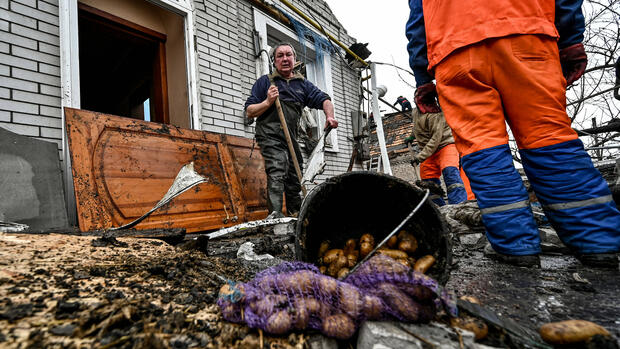Riga The sanctions imposed by the West are having a hard time on Russia’s economy – even if their effects are only slowly unfolding. This is the conclusion reached by the economists at the Vienna Institute for International Economic Comparisons (WIIW), which is known for its expertise in Eastern Europe, in their spring forecast.
According to WIIW, Russia’s economy is stabilizing after gross domestic product (GDP) collapsed in the second quarter of last year. The experts are forecasting stagnation for the current year. However, institute director Mario Holzner emphasizes: “But behind this zero there are massive structural changes.”
On the one hand, import-dependent sectors such as the auto industry or retail are suffering massively from western sanctions. According to estimates by the institute, the auto industry collapsed by 45 percent in 2022, and retail by 12.7 percent.
Meanwhile, the defense industry and areas like pharmaceuticals have thrived, economists point out. WIIW Russia expert Vasily Astrov also cites construction, agriculture and human resources as the pillars of the Russian economy.
In addition to the sanctions, Holzner also sees the war in Ukraine as important for Russia’s economic development. “The longer this war lasts, the less success the Russian army has on the battlefield, the more the war economy has to be boosted, the more ammunition has to be produced,” said the WIIW boss. This goes as far as “a strong plus in pharmaceutical products, which are also needed on the front lines,” Holzner continues.
>> Read here: Russia places Uniper subsidiary under state supervision
According to WIIW Russia expert Astrov, the “booming war industry, the adjustment to sanctions and the reorientation of trade towards Asia” are currently preventing the contraction of Russia’s GDP. “But that doesn’t change the fact that the sanction-related losses from the energy business are now costing the Kremlin dearly.”
Meanwhile, Russia’s President Vladimir Putin has publicly admitted that the sanctions are hurting. In the longer term, the lack of high technology from the West, such as computer chips, will cause problems for Russia, since China cannot supply them either, Astrov said.
The WIIW experts expect Russia’s GDP to grow by one percent in 2024 and by as much as 1.5 percent in 2025. However, the estimates of different institutions on the development of the Russian economy differ widely. The European Bank for Reconstruction and Development (EBRD) is forecasting a decline of three percent for the current year, but the EBRD expects a drop of one percent for 2024.
Ukraine more resilient than expected
The Institute attests that Ukraine has remarkable resilience. In view of the enormous destruction and although so large parts of the population have left the country because of the war, the resilience is “impressive”.
For 2023, the WIIW expects growth of 1.6 percent, but this depends on the further course of the war. A more positive business climate, a better energy supply, the grain deal and international financial aid in particular ensured “cautious optimism”.
The slump in Ukrainian economic output by almost 29 percent last year was a little less than initially feared. Without the systematic bombardment of energy infrastructure by Russia, the decline would have been a little less, according to Olga Pindyuk, Ukraine expert at WIIW.
>> Read here: More than a trillion dollars conceivable – the reconstruction of Ukraine becomes the task of the century
For 2024, the WIIW experts even expect an increase of 3.4 percent for Ukraine. However, WIIW director Holzner emphasizes that the figures are based on the assumption that there will be no quick end to the war in Ukraine, but also no major escalations, such as the use of tactical nuclear weapons.
Other institutes are more cautious in their forecast. For example, the EBRD only expects an increase of three percent in Ukraine in 2024.
Mood in Eastern European countries is “slowly brightening”
Overall, the experts estimate that most of the other countries in Central, Eastern and Southeastern Europe have come to terms with the economic shock of the Ukraine war. In almost all of the 23 countries examined, economic output is likely to grow again in the current year, so the worst fears have not come true, according to WIIW expert Pindyuk.
“Despite persistently high inflation, which is weighing on households and companies, the mood in the region is slowly improving,” said the economist. “This also has to do with the fact that all indicators are now pointing to a slow recovery in the euro zone and its strongest economy, Germany.”
For example, according to the WIIW report, the Polish economy has also shown surprising resilience, although growth is already slowing down again. The reason: high interest rates have a strong impact on private consumption and investment, while inflation undermines wage income.
More: War in Ukraine drives arms spending to new record high
